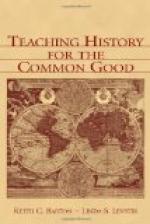EDITOR’S INTRODUCTION
This volume is offered as a guide to history teachers of the high school and the upper grammar grades. It is directly concerned with the teaching methods to be employed in the history period. The author assumes the limiting conditions that surround classroom instruction of the present day; he also takes for granted the teacher’s sympathy with modern aims in history instruction. All discussions of purpose and content are therefore subordinated to a clear presentation of the details of effective teaching technique.
The reader into whose hands this volume falls will be deeply interested in the ideals of teaching implied in the concrete suggestions given in the following pages, for after all the value of any system of special methods rests, not merely on its apparent and immediate psychological effectiveness, but also on the social purposes which it is devised to serve. It must be recognized at the outset that history has a social purpose. However much university teaching may be interested in truth for its own sake, an interest necessarily basic to the service of all other ends, the teaching of the lower public schools must take into account the relevancy of historical fact to current and future problems which concern men and women engaged in the common social life. So the elementary and secondary school teachers of the more progressive sort recognize that the way in which historical truths are selected and related to one another determines two things: (1) Whether our group experiences as interpreted in history will have any intelligent effect upon men’s appreciations of current social difficulties, and (2) whether history will make a more vital appeal to youth at school.
Certainly children, whose interests arise not alone from their innate impulses, but also from the world in which they have lived from the beginning, will be eager to know the past that is of dominant concern to the present. It is clear gain in the psychology of instruction if history is a socially live thing. The children will be more eager to acquire knowledge; they will hold it longer, because it is significant; and they will keep it fresh after school days are over because life will recall and review pertinent knowledge again and again. There can be no separation between the dominant social interests of community life and effective pedagogical procedure; the former in large part determines the latter.
Such educational reforms in history teaching as have already won acceptance confirm the existence of this vital relation between current social interests and the learning process. The barren learning of names and dates has long since been supplanted by a study of sequences among events. The technical details of wars and political administrations have given way to a study of wide economic and social movements in which battles and laws are merely overt results reinforcing




